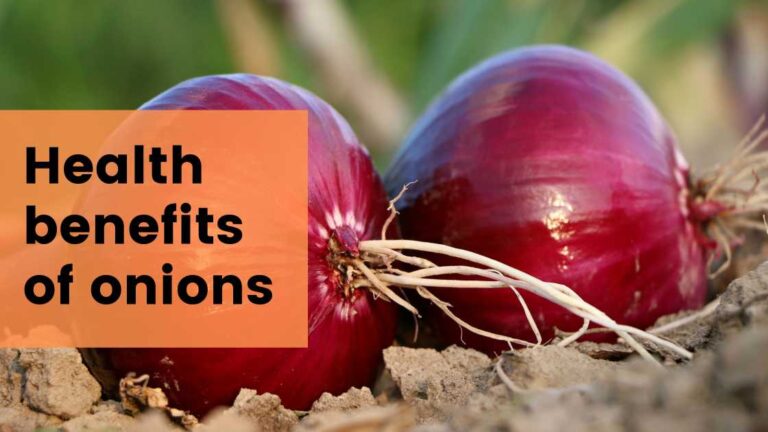Cantaloupe just like most fruits has a lot of health benefits and as such is important for consumers to be aware of. Being aware of the health benefits of cantaloupe is for two main reasons.
The first is for you to know how these fruits will contribute to your health and the second is to know if they may have any negative health implications on you.
What is the Cantaloupe Fruit
The cantaloupe fruit is a fruit under the muskmelon species (a species of melon that belongs to the gourd family). The name of the fruit cantaloupe was made famous by the French in the 18th century. Back then it was known as cantaloup in the French language but was later adapted for English use, thus, leading to its current form cantaloupe.
The French derived the name of the fruit from a town called Cantalupo located in Rome (Present Italy).
The fruit has grey skin which when peeled off reveals an edible layer that is orange in colour. It also contains a lot of seeds that are good for consumption. The cantaloupe seeds are rich in fibre. This helps get rid of excess phlegm in the body.
This fruit can be eaten as fresh food or even as a salad. It is however advisable to thoroughly wash the fruit before eating it. This is because the skin of the fruit is prone to bacteria such as salmonella.
China is the world’s largest producer of cantaloupe fruits.
In this article, you will get to know the health benefits that the cantaloupe fruit has to offer and also why you should eat this fruit.
Health Benefits of cantaloupe fruit
1. It prevents constipation
Constipation is caused by insufficient fibre in the body. When this happens, bowel movements become less frequent and stools become difficult to pass out.
The cantaloupe fruit is very rich in fibre, a food substance that is essential when it comes to healthy bowel movements. Fibre accumulates stool and gives you a regular bowel movement which in turn promotes digestive health in general.
2. Improves vision
Along with vitamin A, the cantaloupe fruit contains zeaxanthin and carotenoids (antioxidants) which play an important role when it comes to eye health and protection. They also help reduce the risk of eye-related diseases such as cataracts, glaucoma and even loss of sight.
People with bad eyesight can take the cantaloupe fruit daily to help improve their eyesight.
3. Lowers the risk of cancer
The fruit contains antioxidants that help battle inflammation and reduce oxidative stress. This can help reduce your risk of getting cancer. The fibre in the fruit can also lower the risk of getting colon cancer.
4. Nourishes the skin
The cantaloupe fruit is blessed with nutrients that are responsible for maintaining and nourishing the skin. These nutrients include vitamin A and vitamin C. These nutrients play a key role when it comes to skin health maintenance.
The role of vitamin A is to help protect your skin from harmful light (UV light) and sun damage. Vitamin C is essential for producing collagen, a protein that gives the skin its structure and fights against wrinkles and sagging.
5. Reduces the Risk of Asthma
The antioxidant choline is present in the cantaloupe fruit. The role of this antioxidant is to help reduce inflammation in people with asthma. Beta carotenes can be also found in the cantaloupe fruit. These are antioxidants that help prevent asthma at the later stages of one’s life.
6. Prevents heart diseases
Nutrients that are very important for the health of the heart can also be found in the cantaloupe fruit. Nutrients such as fibre, potassium and vitamin C can be found in the cantaloupe fruit. Potassium is vital for reducing blood pressure (high blood pressure) which is a health risk to the heart. Another risk factor for heart disease is bad cholesterol.
This can however be prevented by the intake of cantaloupe which contains fibre, a food substance that reduces the level of bad cholesterol in the body.
7. Prevents dehydration
The cantaloupe fruit has high water content and therefore is able to prevent dehydration when taken. This can be attributed to the fact that the cantaloupe fruit is made up of 90% water. Eating cantaloupe fruit, especially during hot days or after an exercise or workout session help keep you hydrated. It also replenishes lost fluids.
Staying hydrated also prevents your heart from putting in more effort when pumping blood. This also improves the health of the heart. This can be seen as a bonus health advantage.
8. Nutrient packed
The cantaloupe fruit is densely packed with a lot of nutrients.
Some of these nutrients include; vitamin A (which is responsible for improving eyesight and boosting the immune system), vitamin C (protects your skin from sun damage), potassium (lowers blood pressure), fibre (prevents constipation), iron (prevents iron deficiency anaemia), vitamin K (essential for blood clotting and bone development), phosphorous (which prevents loss of appetite) and so many other nutrients.
9. Boost the immune system
The cantaloupe fruit has nutrients that aid in enhancing the immune system. It contains vitamin A, a nutrient that helps fight infections. Moreover, it contains vitamin C, which is responsible for making more disease-fighting white blood cells.
It also helps these white blood cells work more effectively and improves the defence systems. It also contains folate, vitamins B and K which also aid in improving the body’s immunity.

10. Regulates diabetes
This fruit is highly beneficial to people with diabetes. This is because cantaloupes have a low glycemic load score of four. Low glycemic load means that your body digests it slowly and prevents a blood sugar increase. Therefore, it is very good for people with diabetes.
Diabetic people who want to taste something sweet once in a while but are afraid of increasing their sugar levels can eat cantaloupes.
Are cantaloupe fruits good for diabetics and should they eat them? Click the link to find more information about whether diabetics can eat cantaloupes and how many they should eat in a day if they can.
The cantaloupe fruit is a very delicious fruit that has a lot of health benefits. This fruit is mostly eaten during the summertime. Its seeds can be roasted and eaten as a snack. The fruit must be washed thoroughly before eating. This is to help remove bacteria from the fruit since the skin of the fruit can harbour a lot of bacteria and insects.
One might think that due to the numerous health benefits that this fruit has to offer, why don’t I eat it in excess amounts to get more health benefits. This is however not advisable because excess intake of the cantaloupe fruit has some side effects. One side effect of excess intake of cantaloupe fruit is that it can cause problems for your kidneys.
The fruit contains a lot of potassium and excess intake of potassium is not good for the kidneys because the kidneys might not be able to filter out the excess potassium which can lead to hyperkalemia (a condition caused by too much intake of potassium or a decrease in the excretion of potassium).
Excess intake of cantaloupes can also lead to diarrhoea.
Why you should eat cantaloupes
Below are some of the reasons why we should eat cantaloupes
1. Eating cantaloupes improves eyesight. The fruit contains a lot of vitamin A which is good for eyesight improvement. People with bad or poor eyesight can gain a lot from eating cantaloupes.
2. It keeps you hydrated. People who exercise a lot or do work that requires a lot of energy can eat cantaloupes to keep them hydrated. This fruit is mostly made up of water (90%) and so eating this fruit will keep you safe from dehydration.
3. The cantaloupe fruit is also good for the skin. Eating cantaloupe fruit nourishes the skin and hair too. The fruit has vitamin A which protects your skin from UV light rays and sun damage, it also contains Vitamin C which fights against wrinkles and skin sagging.
4. It is good for the immune system. The fruit has vitamin A which helps repair worn out tissues in the body and also improves the immune system’s ability to fight against diseases. This in turn keeps on healthy and strong.
5. Another reason why we should be encouraged to eat cantaloupes is that the fruit is for preventing heart diseases. It has potassium which is good for lowering or preventing high blood pressure and reduces the level of bad cholesterol in the body.
REFERENCES
https://www.healthline.com/health/food-nutrition/benefits-of-cantaloupe#ways-to-use-cantaloupe
https://www.webmd.com/diet/health-benefits-cantaloupe#2
https://www.medicinenet.com/10_benefits_of_eating_cantaloupe/article.htm
https://www.medicalnewstoday.com/articles/279176#risks
http://www.foodreference.com/html/a812-cantaloupe-history.html
https://www.livestrong.com/article/275537-what-are-the-benefits-of-cantaloupe-seeds/
https://www.webmd.com/food-recipes/cantaloupe-health-benefits
https://www.livescience.com/54475-cantaloupe-nutrition.html
https://en.wikipedia.org/wiki/Cantaloupe







2 Comments